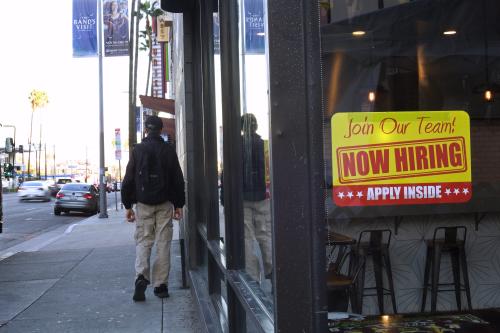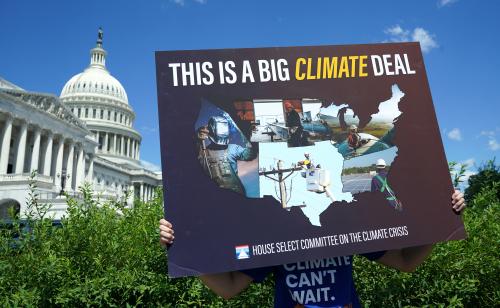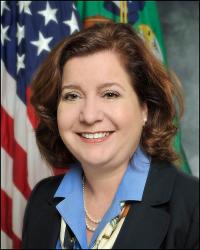For over 50 years, the Brookings Papers on Economic Activity has published research on urgent public policy issues by some of the world’s leading economists. What has made it so successful, and how has it evolved over the years? On this special episode, the last of season 2, out-going BPEA coeditor and host of the Brookings Podcast on Economic Activity James Stock is joined by his coeditor of 8 years, Jan Eberly, and incoming coeditor Jón Steinsson for a discussion on the importance of BPEA in economic policy over the years, the evolution of economic methodologies and analysis, and the direction of BPEA in years to come.
- Listen to the Brookings Podcast on Economic Activity on Apple, Spotify, Google, or wherever you like to get podcasts.
- Learn about other Brookings podcasts from the Brookings Podcast Network.
- Sign up for the podcasts newsletter for occasional updates on featured episodes and new shows.
- Send feedback email to [email protected].
TRANSCRIPT
[music]
EBERLY: I am Jan Eberly, a professor of finance at the Kellogg School of Management at Northwestern University and coeditor of the Brookings Papers on Economic Activity, a semiannual academic conference and journal that pairs rigorous research with real time policy analysis to address the most urgent economic challenges of the day. Thank you for joining us for this episode of the Brookings Podcast on Economic Activity, where we share conversations with leading economists on the research they do and how it will affect economic policy.
This episode will be a little different than the rest of the season after eight years on the job. My coeditor Jim Stock of Harvard University will be stepping down from that role ahead of the upcoming Fall 2023 conference. Although we’ll miss Jim, he will join our advisory board, so we’ll still benefit from his insights and input.
I’m very excited that Jón Steinsson has agreed to take over and join me as coeditor. Jón is the Chancellor’s Professor of Economics at the University of California, Berkeley, a research associate and co-director of the Monetary Economics Program of the National Bureau of Economic Research, and associate editor of Econometrica. Jón and I have already been working on the upcoming programs for September and next March. I speak for all of us—Jim, the Brookings team, and myself—when I say how delighted we are to have Jón in this role.
So, on the podcast today, which is the final episode of the spring season, the three of us will have a discussion about the Brookings Papers at a higher level on the mission, how we approach that mission, and how the papers fit into the broader dialog about economic policy in the United States.
Jim and Jón, welcome, great to see you. Jim, let’s start with you. It’s been great fun working with you. What prompted this move?
STOCK: Well, Jan, I have to say that working with you has just been a real pleasure, too. We got to know each other, I think, best when we were both in the Obama administration. And it’s just been terrific having opportunities to continue conversations on economic policy and actually be able to lead in our own modest way the profession in terms of its input. So, it’s just been a lot of fun.
And I’m actually also I want to say I’m really proud of what we’ve done at BPEA. And I’m also really delighted, absolutely delighted that Jón is taking over in my shoes. And I’m really looking forward to what the two of you are going to accomplish.
So, why am I leaving? Well, basically, my day job is changed and I’ve just got too much work. So, I’m now vice provost for climate and sustainability at Harvard and director of the Salata Institute. It’s really exciting work. The Salata Institute is a university-wide entity driving research, education, and engagement on climate issues across Harvard. This is important. I’m really excited to be able to do it. This is the way I want to spend my time. And frankly, it is a full-time job. So, I’m delighted to be able to pass the baton to Jón. And then, of course, you will be continuing to do such a great job with him.
EBERLY: Well, I’m sad that you’re leaving all of this behind, but I can see where they really have need of your expertise. Thinking about BPEA, how have you envisioned BPEA’s role during the time you’ve been editor?
STOCK: Well, at a high level, the Brookings Papers are unique. They really bring together top academic experts and policy practitioners. And they do it in a way that’s really rigorous and thoughtful. So, there’s lots of opportunities now in the public sphere for academics to weigh in with opinions. But Brookings provides a structured opportunity for that and one in which one can make thoughtful and evidence-based arguments and analyses in a way that you’re not necessarily bound by the restrictions and certainly not bound by the time frames of standard academic journals. So, it plays a unique role in the intellectual ecosystem about the interplay between academics and scholarship and practice and policy. And it’s really great to have that opportunity.
It’s also the case that papers can operate on different timescales at multiple levels. And so, that provides us as editors—and we’ve done this fairly intentionally, Jan—provides us with opportunities to focus on different categories of policies where we think there’s really a need for more clarity in the dialogue and where we can actually push things forward.
So, some of the papers focus on longer-run issues, really explicating challenges, like why does it appear to be that interest rates have been declining, the real rates have been declining so significantly over the long-term. Some of them focus on short-term issues. And as I mentioned, it’s an opportunity, especially on the shorter-term issues, to turn around problems and analyses much more quickly than conventional journals.
EBERLY: So, it sounds like you have some specific ideas and a couple of specific papers in mind as you’re talking. Are there any examples that come to mind as you’re thinking about the special role that BPEA plays?
STOCK: Well sure, one of them, and this is on the short turnaround side, I guess our work on the COVID issues in 2020 really stands out. That was really a unique opportunity to harness the folks at Brookings. Of course, we were all struggling with COVID in our own lives and shifting over to remote work and making sure that teams actually worked at that.
At the same time, we pulled together an extra issue that appeared, I think it was in June of 2020, and then we had the September issue, the regular September issue, and we packed them full of really current research around COVID, on how were the policies working out; what’s preliminary data on the policy impacts; what preliminary information about how the economy was responding to COVID; what are the real time data saying on a daily or weekly basis; how do the masking policies work and what do we think about those issues? What’s the analysis? That was really, I think, an important set of contributions and there was nothing else like it.
Another paper, and this is operating on a somewhat different time scale and maybe in a much more below-the-radar way, but another paper I really liked was from 2018 by Jeff Fuhrer, Eric Rosengren, and Geoff Tootell where they discussed whether the Fed should regularly evaluate its monetary policy framework, which is something that Canada does but the Fed had not been doing regularly. I think that paper really set the stage for amping up the discussions within the Fed and then leading to the Fed’s decision to institute its formal policy review. I think that policy review was a really salutary step both in governance and substantively. And so, I’m proud that BPEA played a small role in that.
EBERLY: It’s been heartening to see how the profession stepped up during COVID, which you mentioned initially, and then on a longer time scale, going back to some of those issues and evaluating how viewpoints changed and what we learned. People were very innovative and entrepreneurial about looking at the limited data that was available quickly, but then were also willing to circle back and evaluate how the environment changed and the data changed and what we learned as more information became available. It was a good moment to be honest about what we could say quickly and what we learned over time.
STOCK: Absolutely. And, you know, another paper that comes to mind was the paper that we had from the Resources for the Future team and others on the social cost of carbon. And that was interesting in its own right, and it had important and interesting work in its own right, of course. But it also played into this broader process of updating, based on new scientific evidence, the social cost of carbon, which is something that the EPA had been doing and has come out recently with new revised estimates that in part are based on what the work was in the BPEA paper. So, that’s another example of how really careful scholarship can play into policy processes in really important ways.
But okay, so enough of this. Let me turn to Jón. So, Jón, let me just reiterate all of this excitement about having you take over as coeditor. It is terrific. I know the two of you have been working hard on the upcoming programs, and I’m looking forward to attending the conference as a participant, but not as an editor. You have broad expertise across a whole lot of areas in macro. What do you see as important areas for us to focus on? I guess not for us, but for you to focus on in the next couple of years.
STEINSSON: Thank you, Jim. And let me start by just saying that I’m very excited to be taking on this role. I have very large shoes to fill. You and Jan have been publishing extremely important and impactful papers over the last eight years, and it’ll be hard to keep up at the same pace with that.
When it comes to the next few years, there are a number of topics that I’m excited about getting papers into BPEA. On the one hand, there are the perennial topics that one always wants to cover. BPEA has a long history of publishing important papers on the labor market, for example. And in that topic, there are topics which are always important, like the evolution of the natural rate of unemployment or the trends in various aggregates, like the employment rate or labor force participation.
But there are also new issues that are arising in that sphere, such as worries about radical technological change and the future of work and AI and so on. And I think it would be useful and good if we could contribute to that debate.
Another perennially important topic is monetary policy. Now, again, there, there are issues that are more topical today than they have been recently. In particular, we’ve just experienced a large amount of inflation for the first time in several decades. And so, the kind of research focus when it comes to the monetary issues has really shifted in the direction of understanding why that occurred, what kind of policy is appropriate in response to that, and more generally, what can we learn about how the economy works from the fact that this happened.
We had, I think, been surprised for the last few decades that even though in some instances the economy ran really hot—it did in the late ‘90s, it did prior to COVID, and yet we saw no inflation—now we all of a sudden did see a bout of inflation. So, I think that raises a lot of interesting topics for research that are very appropriate for BPEA.
At a higher level, I’m hoping to bring in some papers on international topics. I think it’s really important to learn from the experience of other countries. There are many bad things that thankfully have not occurred in the United States for a long time. And in some instances, there’s a tendency within the United States to think that these kinds of things will never happen again, that somehow the United States has graduated from these problems. I always think of the period before the Great Recession when I think it was commonly thought that financial crises were not something that the United States had to worry about anymore—this was a problem for less developed countries. And then, of course, that wasn’t true anymore.
I think this kind of end of history thinking is dangerous. And so, I do want to lean against that by looking at things that are occurring in other countries, both good and bad, that haven’t necessarily happened in the United States recently, but we need to be on guard to think about and make sure that we understand these issues and can respond to them if they do occur in the United States.
STOCK: I certainly think that the inflation experience that we’ve had has been pretty surprising and it’s going to be a topic of considerable academic interest—understanding it properly, understanding the policy responses, how inflation seemed to get out of control. And, what are the dynamics of that are going to be really interesting. And of course, we’re facing a lot of new circumstances, too—the sectoral shifts that are associated with coming out of COVID and how that factors in. So, I’m sure that’s going to be a topic of considerable interest. And of course, it’s unfortunately a topic that we still don’t perfectly understand.
STEINSSON: Yeah, it relates in certain ways also to another topic that I think is becoming more important or being recognized as more important after the shocks that hit us in the last few years, both the COVID shock and the war in Ukraine, which is resilience issues having to do with the large amount of globalization that has happened over the last few decades. Obviously that globalization has had many benefits, but as time has passed, the supply chains that are associated with that gigantic amount of globalization have become long and complicated. And the degree to which the United States economy is reliant on things working well in all kinds of parts of the world has grown a lot.
And so, now we’ve seen several extremely large shocks that kind of opened our eyes to the fact that we need to think about the resilience of this. It works well in good times. But just like the banking sector has to also work well in bad times, this is an area that needs to be resilient to problems that can arise.
EBERLY: Yeah, that raises a point that we’ve seen in a couple of the recent conferences where we have a set of papers on specific topics, say international and globalization, but also monetary policy and financial issues. And over the course of the conference, you see the authors and the participants cross talking between the various papers. Because, the economy has always been complex, but I think maybe we’re seeing it more vividly now, but we’re definitely having these conversations and pieces of research that connect to each other in ways that make the conversation at a place like BPEA especially interesting because you have people who have deep expertise, but you bring them together in an environment where they can connect these topics together, and because policy implications don’t fit neatly in silos. Research, we try to fit it neatly in silos, but it doesn’t work that well either, and it definitely doesn’t work in policy. So, having these kind of more mature and far-ranging conversations around the research pieces is, I think, a unique characteristic and advantage of BPEA.
STOCK: Another interesting note building out what Jón said is if you think about this in a broader historical context, before the financial crisis recession we were all wondering how we had managed to have so many decades of quiescence and moderation. And that was all the discussion about congratulating ourselves as a profession, as half of having business cycles and inflation all seem to be under control. And we’ve been beset now in the last, whatever, 12, 13 years, by a whole mess of tough shocks between the financial crisis, COVID, the war in Ukraine, of course, and then recently we had this little scare in the banking sector. And I mean, maybe that’s not quite over, but in terms of the runs on the banks.
So, I think it raises awareness about how many open challenges and open questions there are going forward that we need to be thinking about.
STEINSSON: Yeah. Fortunately or unfortunately, history doesn’t end, even though we sometimes think it does.
STOCK: Yeah. And you know, we’re now embarking on this massive energy transition, which is something I think about in my day job a fair amount. And that’s going to entail trillions of dollars and changes in substantial industrial structures and political economy issues and so forth. So, who knows what new excitement that’s going to that’s going to provide for macro economists.
STEINSSON: It’s interesting that particular issue. We had, of course, this very significant piece of legislation that was passed last year, the Inflation Reduction Act. And it’s really brought to the fore a new debate and reevaluation of issues that maybe we should have been talking about more before having to do with industrial policy. And I think that’s a really interesting issue. It’s an issue where we see a connection between two important literatures: the literature on climate change and literature on industrial policy. And I’m excited about that. I think we should focus on that. I think that’s a debate that needs to be had and is really consequential. And I’m definitely looking for things to publish on that issue.
STOCK: Yeah that’s great. I would really endorse that. That’s an area that we looked at, we as a profession looked at like a decade or a little more ago, but now this is at the policy front and it’s a great opportunity for economists to take a closer look with modern tools, more data.
EBERLY: It also brings to the front this combination of the long-run issues that you mentioned in your in your introduction, Jim, as well as the short-run issues that as we confront these immediate challenges that feel like crises, we also have in the back of our minds these slower moving crises that require our attention. And there is a temptation to let the immediate be the enemy of the important. But we have to keep working on many channels simultaneously. And research tends to focus on one thing at a time. But these are questions that require multiple channels and people maybe working in bigger teams or we’re bringing together conversations that wouldn’t normally be happening simultaneously.
STOCK: So, let me switch just a little bit and ask both of you a question about methods, if I could. So, one of the ways the profession advances is by developing new methods that are better suited to answering old questions or are now suited to answering new questions. And so, a lot of new methods keep coming all the time. There’s certainly been this major revolution in identification, which is not new but really quite important and has really taken over much of the profession, and in many ways appropriately so. And then we have a higher level of computational capabilities in other sorts of structural models.
One of the features of Brookings Papers if you look back is that the methods that are used in papers tend to evolve over time. That one of the ways that Brookings stays fresh is by making sure that it’s using current methodology. At the same time, there’s a tension between being able to actually answer a real-world question and to stick to the methods in some very specific sense. So, I’m just wondering what your thoughts are about evolving methods and the Brookings Papers over the next few years. And by the way, you’re not allowed to answer anything that has to do with Chat GPT.
EBERLY: I’m struck by our discussion of complexity and how many different issues we’re dealing with simultaneously. And we were helped post-financial crisis by a real revolution in data availability that started with housing data in particular that became available. But since then, of course, there’s in addition to official government data, there’s been more administrative data. We called on that at the beginning of COVID, for example, when COVID was moving much faster than the official data was. And so, data from administrative sources, say from the private sector, really helped us understand more quickly, or at least to get a sense more quickly of what was happening. And the availability of data and our technological ability to process it has just been transformed over the last ten years or so. And BPEA has benefited from that and played a role in that and made new data available.
But a caution comes up because all of us work with students, we know that the worst thing is when a student starts with data rather than starting with a question, because you can wallow in the data for a long time, and what you really need is a structure. You need an eye for a question or a sense of what’s important and what’s interesting.
So, one thing I look forward to is bringing, I won’t say theory, but it’s really theory and structures to this new data that we have that can give us some guidance to these really complex and interrelated questions that we face and then help organize the data that we have that we can bring to bear on these ever harder questions. So, AI may be a part of that, but even where we are now, we have new data posted on the BPEA site with every conference. And, we have talented people who know how to use it to ask important questions that are relevant for policy and for the future of the economy.
STOCK: Jón, how about you?
STEINSSON: Yeah, so, as you said, Jim, earlier in the podcast, BPEA plays this special role of sitting at the crossroads between frontier research on the one hand and real-time policy analysis on the other hand. And it’s really important, I think, to stay true to that, even when the methodology of the field is evolving. Now, in some cases, the methodology is becoming more complicated, and then it could be more difficult to maintain that conversation. But I think it’s really important that we continue to do that.
I agree also with what you said before that there is in particular been a very substantial advance methodologically on the empirical side of our field with standards rising when it comes to what’s considered credible causal evidence. Now, many people think that that’s gone too far and it’s led people in our profession, at least at the top of the kind of academic part of the field, to focus too much on esoteric things that they happen to have a natural experiment about.
And I think it’s very important for BPEA to push against that. BPEA needs to be oriented towards using these methods to answer relevant, important policy questions. So, we want to be trying to use these methods and exploit them, but for important big questions, not compromise on the fact that what we’re about is the big, important, practical policy-relevant issues.
Now, one other thing I’d like to mention on this topic is that BPEA has long been an empirically-oriented journal in macroeconomics, and more empirically oriented than many of the other top journals in the field. And I think this is a really important role that BPEA plays in our field because macroeconomics at least for the last few decades took kind of a fairly strong turn in the in the direction of theory.
My wife and coauthor, Emi Nakamura, she very often talks about how many BPEA papers she teaches to our graduate students. And the reason is that there’s a dearth of papers like that in other top journals. BPEA papers will often cover an important issue in an evenhanded manner from an empirical point of view. And if you are somebody that’s coming to this issue without deep knowledge of it and just want to know what is an even-handed assessment of what’s going on some topic, it’s very often the case that BPEA papers are really excellent places to do that, and much better often than the top papers in other top journals because those are often pushed to take a particular point of view or to test the model or something that the high-brow academics are very interested in, but at the expense of just the kind of what is really true—if you have a real horse in the race, you’re trying to make the case for that horse as opposed to an even handed assessment.
So, I like the fact that BPEA often gives a good evenhanded assessment of an issue as opposed to something like a horse race. Good examples of this, for example, are a paper that BPEA published about ten years ago by Elsby, Hobijn, and Şahin about the falling labor share. That paper’s published around the same time as other extremely influential papers in other top journals. But Emi still teaches that paper because she feels that it has this feel. Another good example is Jim’s own work on the Great Recession, for example.
Now on the other side of things, on the more theoretical side of things, I think it is pretty challenging the fact that methodology on the theoretical side of our field has become very complicated, these large quantitative structural models. And it’s a real challenge, I think, to have this crosswalk between policy-oriented research and that kind of work. I’d really like to do it. One of my ambitions as an editor here is to try to make that work. I think about it a lot, but I think that is a pretty challenging thing.
STOCK: Well, that’s great. That sounds like a wonderful ambition. And, you’re really right. I mean, Brookings is an opportunity to really further an informed dialogue or an informative dialogue between academics and policymakers. And I think it’s an opportunity for us and now for you as editors to set academic agendas and to lay out issues.
So, maybe this is a good place to end. And let me just thank both of you for being here and thank you both especially for taking this on and continuing, Jan, and joining anew, Jón. It’s going to be a great partnership, I’m sure.
[music]
EBERLY: Thank you, Jim. And we look forward to working with you in your new role with BPEA.
Once again, I’m Jan Eberly, professor of finance at the Kellogg School of Management at Northwestern University and coeditor of the Brookings Papers on Economic Activity, together with Jón Steinsson. And this has been the Brookings Podcast on Economic activity. Thanks to Jón and Jim for this great conversation. And be sure to subscribe to get notifications about the next season of the podcast.
The Brookings Podcast on Economic Activity is produced by the Brookings Podcast Network. Learn more about this and our other podcasts at Brookings dot edu slash Podcasts. Send feedback to Podcasts at Brookings dot edu and find out more about the Brookings Papers on Economic Activity on the Brookings website: Brookings dot edu slash BPEA.
Thanks to the team that makes this podcast possible, including Kuwilileni Hauwanga, supervising producer; Fred Dews, producer; Gastón Reboredo, audio engineer; with support from Shannon Meraw and Chris Miller in economic studies at Brookings. Show art was designed by Katie Merris at Brookings, and promotional support comes from our colleagues in Brookings Communications and Economic Studies.
The Brookings Institution is committed to quality, independence, and impact.
We are supported by a diverse array of funders. In line with our values and policies, each Brookings publication represents the sole views of its author(s).









Commentary
What’s BPEA’s role in shaping economic policy?
June 8, 2023